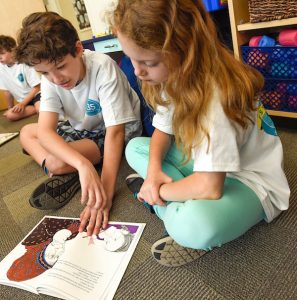Recommendations for Gr K-5 students provided by Trina O’Connor, The Fletcher School Academic Affairs Coordinator, Grades K-5
Summer is right around the corner, and while children are counting down the days until their much-deserved break from school, many parents are considering ways to keep their child engaged in learning throughout the summer.
For many children, a break from learning over the summer means that skills in reading, math, and writing don’t always pick up where they left off at the end of the previous school year. In fact, studies have shown that without continued practice children can lose one to three months of academic growth. This phenomenon, often referred to as “summer setback”, “summer brain drain”, or “the summer slide”, is oftentimes a concern for parents and teachers, especially those of students with learning and attention issues.
At Fletcher, we highly encourage parents to engage their child in routine learning experiences over the summer. Practice and repetition of learned skills are critical, especially if your child struggles with memory issues, confidence, or has specific learning gaps. This doesn’t mean that summer must be all work and no play! Below, we’ve provided a list of daily or weekly tips and tricks that allow your child to practice academic skills while enjoying the fun and relaxing days of summer.
Where to Start?
Math, reading, and writing are all important skills to practice. We recommend talking to your child’s teacher(s) before the end of the school year to discuss their recommendations for summer practice. Ask for their suggestions on how to reinforce or strengthen particular skills. It may also be helpful to seek out recommendations from other parents, neighbors, and specialists.
While there are many structured learning options through summer programs, tutoring, etc., here are some easy everyday tips and tricks to practice reading, writing, and math at home:
Reading
Daily reading (even for 10-15 minutes) is key to maintaining skills, building comprehension, and developing a love of reading. – Parallel reading (a parent reads a page and then the child reads the following page), is a particularly good way to model and practice reading fluency.
– Creating conversation and asking questions regarding the story supports comprehension skills.
– Reading comic books & magazines are fun variations of text.
– Reading recipes/cookbooks and cooking together
– Form a Book Club! Create a neighborhood book club and encourage the kids to come up with a fun name to build excitement. Or, simply have an informal book club discussion with your child(ren) while reading a book together.
– Visit the library! It is a free resource with lots of programs for children.
– Poetry is always an option, too!
Writing
Like reading, writing can take all forms! Here are a couple fun ways to encourage daily writing:
– Letters to family and/or friends
– Writing a grocery list or a packing list for your summer trip
– Daily journaling: Let your child choose what to write about and encourage them to share their daily entry. Also, provide a new, clean journal with a variety of new writing tools “just for journaling.”
Math/Problem-Solving Skills
Math is everywhere. Look for opportunities to incorporate math into daily living.
– Bake and/or cook together: encourage your child to help measure ingredients.
– Scavenger hunts are a fun way to develop strategy and problem-solving skills.
– Play board games: games are a great way to reinforce skills in problem-solving, communication, patience, and persistence.
– Puzzles help integrate problem-solving and visual discrimination.
– Give your child a “budget” or an amount of money for a time frame and have them shop. This is a way to practice real life money skills.
– Work on the concept of time: Ask your child to figure out the time you need to leave a location to arrive at your destination. You can also ask them to figure out when you will arrive at the next location based on when you leave.
Other Engaging Activities and Apps
– Meals: (Establish a family rule of no electronics at the dinner table.) Meals together are a great opportunity to engage in conversation with your child. Talk about what they learned today or simply take advantage of this time to talk.
– Games and apps: while it is very important to limit time spent with electronics, there are many apps that can help reinforce and strengthen reading and math skills. Along with appropriate parental supervision of devices, Fletcher faculty recommend the following free or low-cost apps:
Apps for reading
Starfall ABCs (free)
Toontastic (free; story writing practice)
Comics Head (free; create your own comic)
Puppet Pals 2 ($5.99 for storytelling)
Sight Words Ninja ($1.99)
Winning Words Series ($.99/ea; various apps for a variety of words)
Apps to practice math
Splash Math
Math Slide (place value)
Times Table Quiz!
Times Table Cloud Click Game
Mystery Number ($1.99 for number sense)
Counting Coins (free)
Remember, Boredom Is O.K.!
As you plan exercises and activities for your child this summer, remember that it’s OK for your child to be bored at times. In fact, occasional boredom has proven to have many benefits. According to Psychology Today, “Children who experience a lack of programmed activity are given an opportunity to demonstrate creativity, problem-solving, and to develop relational skills that may help them later in life.” It is also important to allow your child time without any outside stimulation or planned activity. Besides, isn’t that what summer is all about?
For Further Information:
Understood
IDA America
Brookings
Summer Learning Institute
Psychology Today
![]()
About the Author:
Trina O’Connor earned a Bachelor’s in Early Childhood Education and a Master’s Degree in Reading Education, K-12. She has Classroom Level Certification from the Academy of Orton Gillingham. She has over 20 years of teaching experience ranging from K-12 working with students in private, public, and independent school settings. Her extensive experiencing teaching students with a wide range of abilities and disabilities contributed to her passion for teaching and supporting students with Language Based Learning Disabilities. In her current role of Academic Affairs Coordinator at The Fletcher School, she is provided the opportunity to support administrators, teachers, and students in a K-5 setting, implementing all of the strategies and training that she has benefited from over her professional career.
Classroom Level Certification from the Academy of Orton Gillingham. She has over 20 years of teaching experience ranging from K-12 working with students in private, public, and independent school settings. Her extensive experiencing teaching students with a wide range of abilities and disabilities contributed to her passion for teaching and supporting students with Language Based Learning Disabilities. In her current role of Academic Affairs Coordinator at The Fletcher School, she is provided the opportunity to support administrators, teachers, and students in a K-5 setting, implementing all of the strategies and training that she has benefited from over her professional career.
![]()

The Fletcher School
5800 Sardis Road
Charlotte, NC 28270
704-365-4658
www.thefletcherschool.org
Facebook: @FletcherFalcons
Twitter: @FletcherFalcons
Instagram: @fletcherfalcons





